The Health Benefits of Peaches

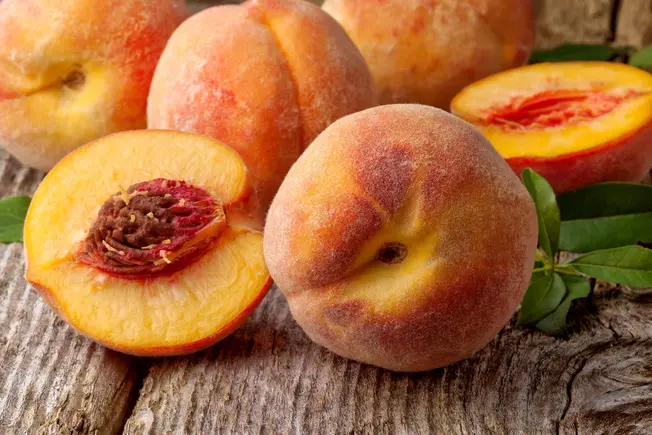
Peaches Promote Healing
Don’t be fooled by a peach’s small size and delicate skin. Just one medium peach has about 11% of the vitamin C you need each day. This nutrient helps your body heal wounds and keeps your immune system going strong. It also helps get rid of “free radicals” -- chemicals that have been linked to cancer because they can damage your cells.

Help Your Eyesight
An antioxidant called beta-carotene gives peaches their pretty golden-orange color. When you eat it, your body turns it into vitamin A, which is key for healthy vision. It also helps keep other parts of your body, like your immune system, working like it should.
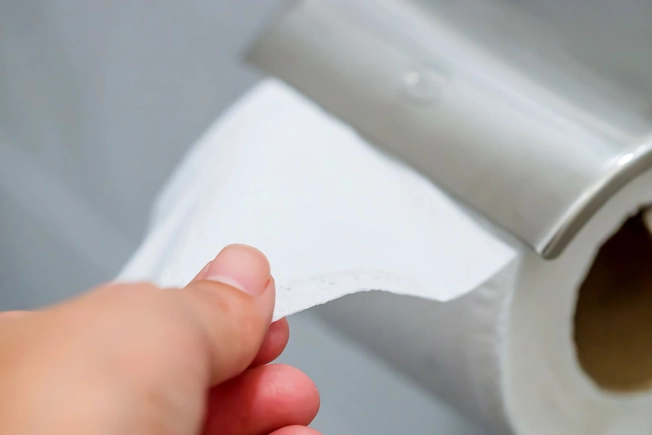
Keep Digestion Running Smoothly
One medium peach can give you as much as 6% to 9% of the fiber your body needs each day. High-fiber foods can protect you from health problems like diabetes, heart disease, and colorectal cancer. But the benefit you may notice the most happens in the bathroom: Getting enough fiber can help prevent constipation.
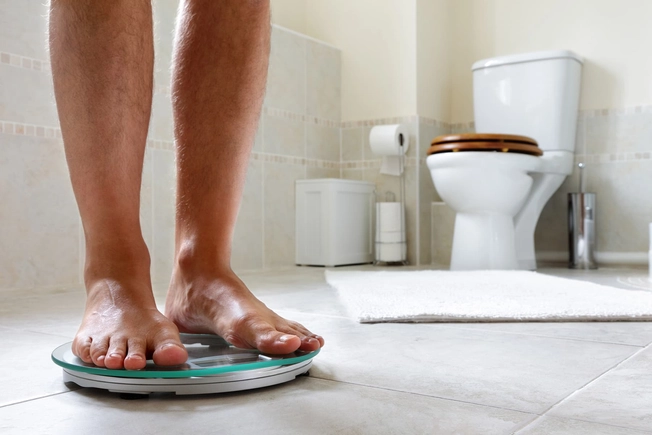
Help You Stay a Healthy Weight
Clocking in at fewer than 60 calories, peaches have no saturated fats, cholesterol, or sodium. And more than 85% of a peach is water. Plus, foods high in fiber are more filling. When you eat them, it takes you longer to feel hungry again.
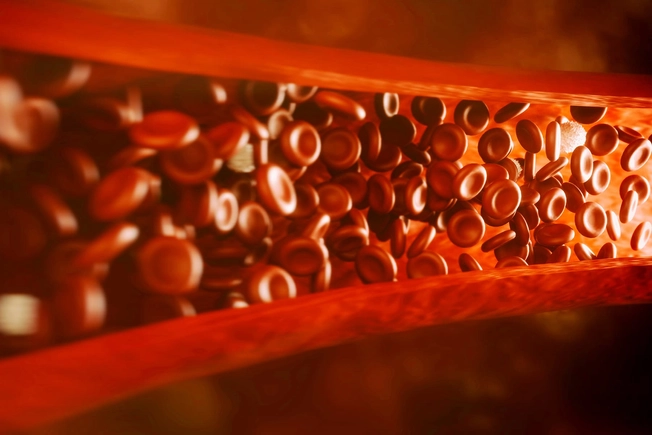
Get Your Vitamin E
Nuts and seeds are the best-known sources of vitamin E, but peaches are ripe with it, too. This antioxidant is important for many of your body’s cells. It also keeps your immune system healthy and helps widen blood vessels to keep blood from clotting inside.
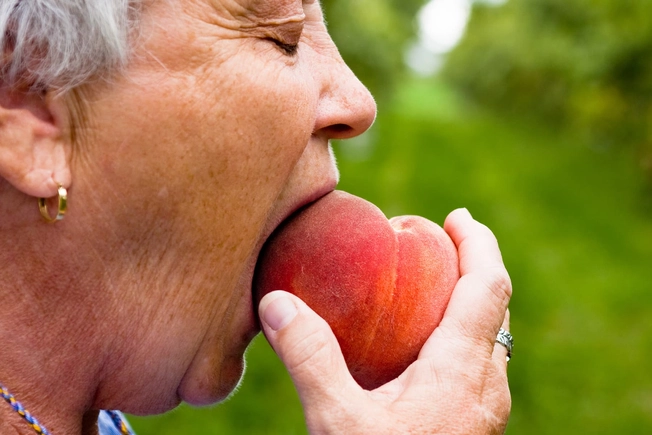
Keep Your Bones Healthy
Potassium can help balance out the effects of a diet high in salt. It may also lower your blood pressure, along with your chances of kidney stones and bone loss. You need about 4,700 milligrams of potassium every day, and it’s far better to get it from food than a supplement. One small peach has 247 milligrams of potassium, and one medium peach can give you as much as 285 milligrams of potassium.
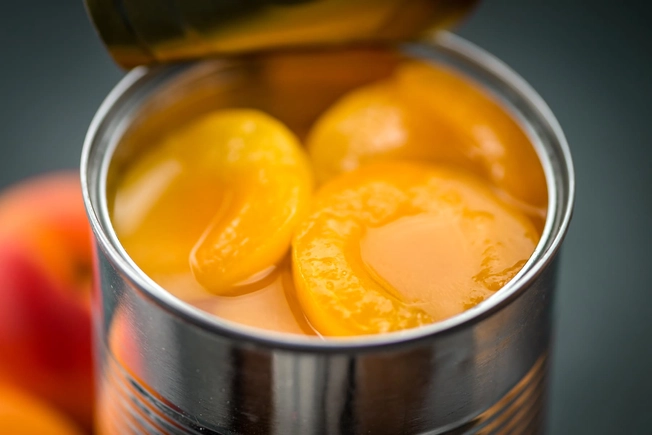
Go Easy on Your Gut
If you have stomach trouble, a snack of canned peaches may be a good idea. They have a soft texture, are lower in fiber than fresh fruit, and are easy to digest. As part of what’s called a “gastrointestinal soft diet,” canned peaches can help soothe an upset stomach and ease diarrhea and gas.

Give You Something to Smile About
As sweet as they are, peaches may help keep your teeth healthy because they have fluoride. This mineral, which you find in toothpaste, is also in some foods, including peaches. It helps get rid of the germs in your mouth that can cause cavities.

Choose a Perfect Peach
The sweeter the smell, the riper the peach. (They’re members of the rose family, after all.) They’re ready to eat when they give to the gentle pressure of your finger. Firm peaches can sit on your counter for a few days to ripen, but once they’re ready, pop them into your fridge. Leaving them out once they’re ripe will lessen their vitamin C.

Get Creative
Yes, you can eat a fresh peach out of hand, but why stop there? You can also bake, grill, broil, or saute this mellow stone fruit. Add muddled (gently smashed) peach slices to your iced tea or lemonade or throw some into a blender with yogurt or milk to make a healthy smoothie. Spicy peach salsa also makes a sweetly healthy summer topping for fish or chicken.
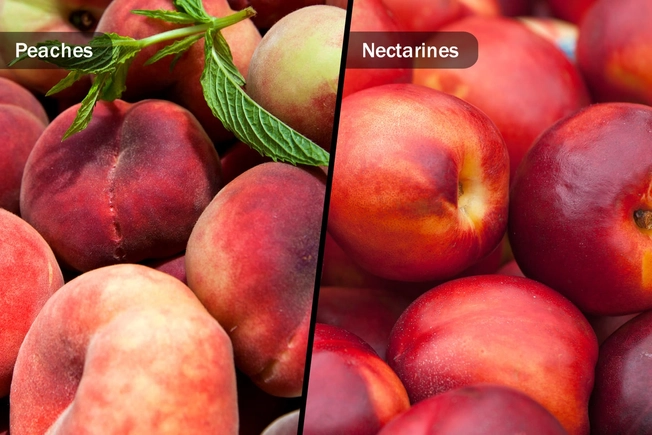
Close Cousin
Peaches have a lot of nutrients in their skin. (Just make sure you rinse them before you eat them, to get rid of any dirt.) If you’re not a fan of the fuzzy texture, go for a nectarine. They’re actually peaches at heart. Just one different gene gives them a smooth peel.
IMAGES PROVIDED BY:
- Thinkstock
- Thinkstock
- Thinkstock
- Thinkstock
- Thinkstock
- Getty
- Thinkstock
- Thinkstock
- Getty
- Getty
- Thinkstock
Mayo Clinic: “Dietary fiber: essential for a healthy diet.”
Ohio State University CARES: “Farm to Health Series: Maximize Your Nutrients from Apples, Peaches, Pears, Plums and Apricots.”
National Cancer Institute: “Antioxidants and Cancer Prevention.”
National Institutes of Health Office of Dietary Supplements: “Vitamin C,” “Potassium,” “Vitamin E.”
Louis Bonduelle Foundation: “Beta-Carotene.”
Rutgers/New Jersey Agricultural Experiment Station: “Health Benefits of Peaches: A Delicious Summer Fruit.”
ISHS Acta Horticulturae 841: “Health Benefits of Peach, Nectarine and Plums.”
Cleveland Clinic: “Gastrointestinal Soft Diet Overview.”
U.S. Department of Agriculture: “Household USDA Foods Fact Sheet: Fresh Peaches,” “USDA National Fluoride Database of Selected Beverages and Foods, Release 2.”
EatforHealth.gov.au: “Fruit.”
UW Health: “Low Potassium Diet.”
Harvard Health Publishing: “Should I take a potassium supplement?”
University of Southern California: “Fruit and veggies rich in potassium may be key to lowering blood pressure.”
Tufts University Health and Nutrition Letter: “Pick Peaches for Healthy Nutrients.”
Ackerman Cancer Center: “The Health Benefits of Nectarines and Peaches.”
Produce for Better Health Foundation: “Top 10 Ways to Enjoy Peaches.”
